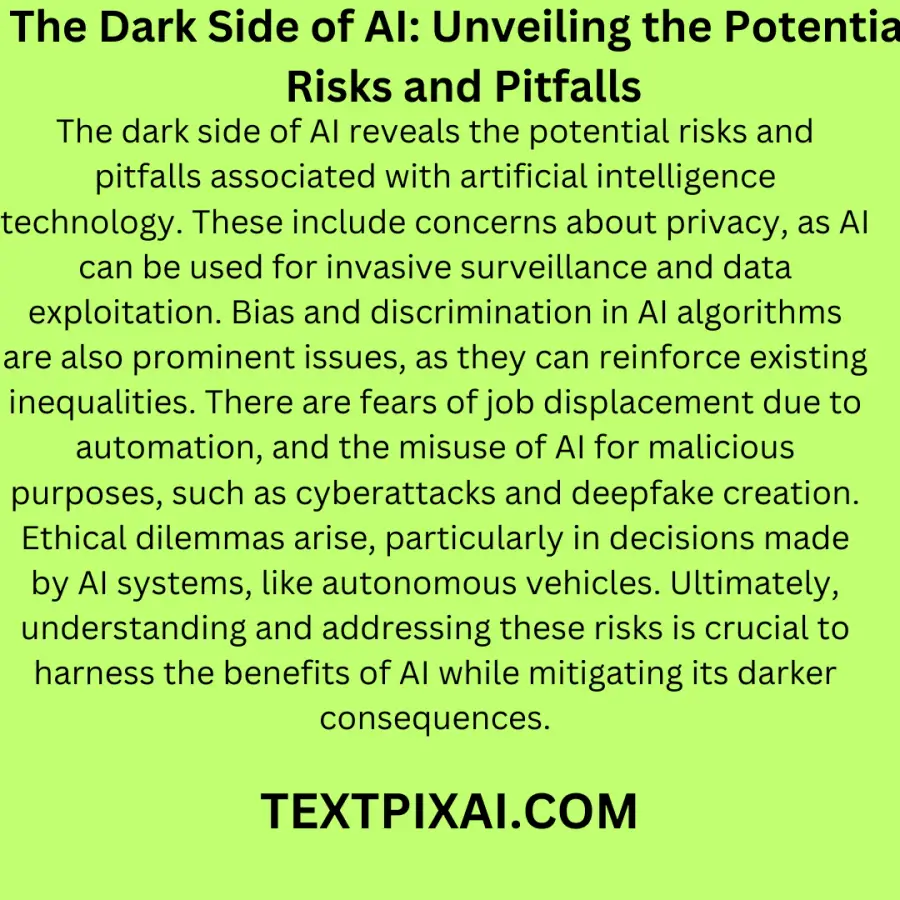The Dark Side of AI: Unveiling the Potential Risks and Pitfalls
Introduction
In a world increasingly dominated by technology, Artificial Intelligence (AI) has emerged as a powerful force with the potential to reshape industries and revolutionize our daily lives. While the promises of AI are vast and alluring, it is essential to shine a light on the dark side of this technology, unveiling the potential risks and pitfalls that come with it. This article delves into the shadowy realms of AI, exploring the ethical, social, and practical concerns that demand our attention.
The Genesis of AI and its Ascendance
Artificial Intelligence, born from the desire to mimic human intelligence in machines, has made remarkable strides in recent years. The development of machine learning algorithms, neural networks, and deep learning techniques has propelled AI to the forefront of technological innovation.
The Ethical Dilemmas of AI
Bias and Discrimination
One of the most pressing concerns surrounding AI is its propensity to perpetuate bias and discrimination. AI systems are only as unbiased as the data they are trained on. When these datasets are flawed or biased, AI can reinforce societal prejudices, leading to unfair outcomes in areas such as hiring, lending, and criminal justice.
Privacy Invasion
AI's insatiable appetite for data can lead to severe breaches of privacy. From facial recognition technology to surveillance algorithms, the erosion of personal privacy is a significant concern. The omnipresence of AI-powered surveillance has raised questions about the boundaries between security and individual freedoms.
You may also like to read:
The Role of AI in Environmental Conservation
Job Displacement and Economic Impacts
Automation and Job Losses
While AI promises efficiency and productivity gains, it also poses a substantial threat to employment. Automation driven by AI can lead to job displacement, particularly in industries reliant on manual labor. Addressing the potential economic fallout is a challenge governments and societies must confront.
Security Risks
Cybersecurity Threats
The interconnected nature of our digital world makes it vulnerable to cyberattacks powered by AI. Hackers can leverage AI to amplify their capabilities, making it harder to defend against data breaches and other cyber threats.
Unpredictable AI Behavior
The Black Box Problem
AI's decision-making processes often resemble black boxes, making it challenging to understand why AI systems make specific choices. This opacity raises concerns about accountability and the ability to rectify erroneous AI decisions.
The Road Ahead: Safeguarding Against the Dark Side
Addressing the potential risks and pitfalls of AI requires a multi-pronged approach. To navigate the shadows, we must:
1. Ensure Ethical AI Development: Implement strict ethical guidelines for AI development to mitigate bias and discrimination.
2. Protect Privacy: Enforce robust data protection laws and regulations to safeguard individual privacy in an AI-driven world.
3. Reskill the Workforce: Invest in education and training programs to equip the workforce with skills needed for AI-driven industries.
4. Strengthen Cybersecurity: Bolster cybersecurity measures to protect against AI-fueled cyber threats.
5. Transparency and Accountability: Advocate for transparency in AI decision-making and hold organizations accountable for AI-related errors.
Conclusion
While AI holds immense potential, we must confront the dark side of this technology head-on. The risks and pitfalls outlined here are not insurmountable but demand our vigilant attention. By navigating the complexities of AI with ethics, responsibility, and foresight, we can harness its power for the betterment of society.
FAQs
1. What is AI's black box problem?
- The black box problem refers to the inherent opacity in AI decision-making processes, making it difficult to understand why AI systems make specific choices.
2. How can bias in AI be mitigated?
- Bias in AI can be mitigated by ensuring diverse and unbiased training datasets and implementing ethical guidelines in AI development.
3. What are the economic impacts of AI?
- AI can lead to job displacement in certain industries, necessitating the reskilling of the workforce for AI-driven jobs.
4. What are the privacy concerns associated with AI?
- AI's thirst for data can lead to privacy invasion, with technologies like facial recognition and surveillance algorithms posing significant concerns.
5. How can we safeguard against AI cybersecurity threats?
- Strengthening cybersecurity measures and staying updated on AI-driven threats is essential to safeguard against cyberattacks powered by AI.








